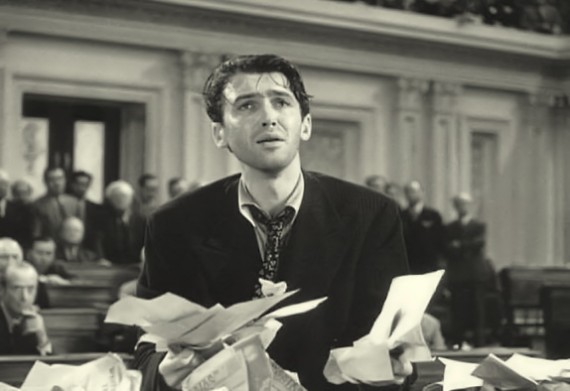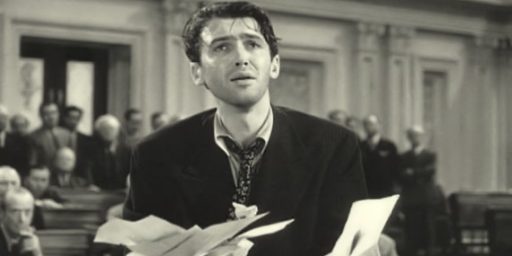Supreme Court Rejects Legal Challenge To Filibuster
Not unexpectedly, the Supreme Court has declined to hear a case challenging the Constitutionality of the Senate filibuster.
More than two years ago, the public advocacy group Common Cause, joined by a small group of Democratic Congressman and civilian Plaintiffs that apparently consist of people who could potentially benefit from the so-called DREAM Act that would give certain benefits to the children of illegal immigrants, filed a lawsuit in the United States District Court in Washington alleging that the filibuster was unconstitutional. When I wrote about the lawsuit at the time, I noted skepticism of the lawsuits merits given the fact that the Constitution give each House of Congress the authority to set their own rules and that the Federal Courts have been generally reluctant to intervene in internal disputes in the Legislative Branch over the application of those rules to specific cases. I also noted that it was somewhat ironic that Common Cause was involved in the lawsuit given the fact that, just seven years earlier, the group was arguing in favor of the filibuster when it was the center of a dispute between Democrats in the Senate and the Bush Administration over judicial nominees. As expected, the U.S. District Court Judge hearing the case dismissed it just seven months after it had been filed largely on those grounds. Common Cause appealed the lawsuit to the Court of Appeals for the D.C. Circuit, and that Court finally got around to issuing its own opinion in the case in April, affirming the District Court’s dismissal as one would have expected. Undaunted, Common Cause appealed the case yet again, this time asking the Supreme Court to accept the case for appeal but, yesterday, the Justices announced without comment that they had denied the request for a Writ of Certiorari, thus bringing an end to the matter as far as the Courts are concerned:
WASHINGTON—The Supreme Court on Monday declined to review whether the Senate’s filibuster rule violates the Constitution, denying without comment an appeal filed by a public interest group and four House Democrats.
Lower courts had dismissed the lawsuit and said Common Cause and the lawmakers couldn’t sue over Senate rules, reasoning in part that the Senate has constitutional authority to set its own procedures.
The lawsuit was brought in 2012 in response to immigration and election procedures bills that died in the Senate when they didn’t receive the 60 votes needed to overcome filibusters. Both measures passed the House in 2010 and had majority support in the Senate.
Under Senate rules, a minority can in many instances prolong debate indefinitely, effectively killing legislation, unless a 60-member supermajority votes otherwise. Democrats last year changed the rules for most presidential nominations, easing passage for executive branch jobs and judicial posts except for the Supreme Court.
One of the bills, known as the Dream Act, would have made some illegal immigrants who were brought to the U.S. as children eligible for citizenship. The Disclose Act, conceived in response to the 2010 Supreme Court’s Citizens United decision, would have expanded disclosure of the sources of political spending.
Even if the Court had accepted the case, the outcome seems as though it would have been inevitable, and that the rulings of the District Court and Court of Appeals would have been largely affirmed First of all, as I’ve noted before, the Constitution gives both bodies of Congress near complete authority to set their own rules, including the rules governing debate, which is essentially what the filibuster rule turns out to be since it is actually a rule about when the Senate can cut off debate on a piece of legislation or a nomination rather than a rule that attempts to create a supermajority for the passage of legislation as its opponents characterize it being. There have been few Court cases that deal directly with the constitutionality of the rules adopted by each Chamber and their application, but generally the Courts have been deferential to the bodies themselves, with the one notable exception being the case of Powell v. McCormack which involved the question of the authority of the House of Representatives to accept or reject the credentials of a Member who was duly elected in an election that did not appear to be tainted by allegations of fraud. Given that, it’s not surprising that the Court declined to hear this case, which seems to fall clearly within the discretion granted by the Constitution.
Looking specifically at the filibuster in the context of the Constitution, it seems clear that the argument that the rule is unconstitutional simply had no merit. The Constitution itself has few rules about how many votes are required to act in either House of Congress. The ones that stand out, of course, are the provisions that require a Senate to have a two-thirds supermajority to ratify treaties, pass an amendment to the Constitution, and convict the President or any other Federal official brought up for trial after impeachment in the House of Representatives. Beyond that, the Constitution says nothing about how the Senate, or the House, can conduct itself in terms of advancing legislation in ways that require more than a simple majority. Additionally, it’s worth noting that there are rules in the House of Representatives that allow for the advancement of legislation only if a supermajority can be achieved. Ordinarily, debate in the House is controlled by rules for debate that require a certain amount of time for debate on every bill before the House, with the time typically divided equally between the two parties, or the two sides of the debate in cases where the leadership in each party actually agrees on how a bill should be disposed of but there is some minority caucus that takes the other position. The House can suspend those rules, though, and sometimes does so on an “emergency” basis for something such as disaster aid, but in order for any such legislation to pass the body it must get “Yes” votes from two-thirds of the membership, which would mean 290 votes if all 435 seats are filled but is typically below that number given that there are frequently times when the actual membership of the House falls below 435 due to retirements or the death or disability of a Member of Congress. As far as I know, nobody has ever challenged the validity of that rule even though it is, functionally, identical to the Senate’s filibuster rule. If they did, of course, the outcome of any such suit would likely be identical to what happened here.
It is, of course, somewhat ironic that the Court announced its disposition of the Common Cause case yesterday given that, after today and beginning in January 2015, we will likely be faced with a situation where the party that would want to be taking advantage of the filibuster will be the one that has spent the last five years complaining about it. While the Senate did reform the filibuster rule significantly when it removed the sixty vote requirement for Presidential nominations other than Supreme Court nominations, it remains in effect for legislation and nominations to the Supreme Court. If Republicans do gain control of the Senate, they could of course try to reform the filibuster even further by reducing or eliminating its application to legislation, among other things. It seems unlikely, though, that they would do so under current political circumstances, and indeed Mitch McConnell has said that the GOP has no intention of tinkering with Senate filibuster rules if it gains power. Whether that position would remain the same if the GOP retains the Senate in 2016 and a Republican President is elected is, of course, an entirely different question. In any case, though, as expected, the latest effort to get Courts to eliminate the filibuster ended as I thought that it would. Well, at least some lawyers somewhere got paid for this work one hopes.






